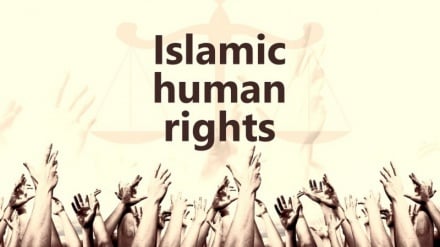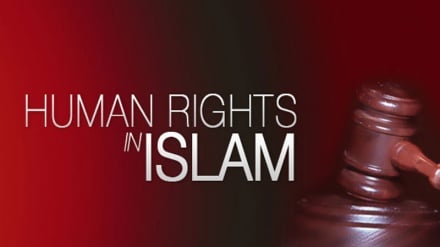Islamic Human Rights (34)
Welcome to today’s episode of the series Islamic Human Rights. In this episode, we study the conditions and rules and regulations of freedom of expression within the framework of Islamic human rights.
Last week, we spoke of the right of freedom of press, mentioned in human rights documents; and some of the viewpoints of the divine religion of Islam in this regard. It was also stated that expressions and writings are defined as a social behavior, maintaining an extensive and unique social influence. Thus, the ruling system and the government are right to set a number of especial rules and regulations in this domain. Meanwhile, Many Islamic teachings revolve round expressions and remarks. Whenever the guidance of a community and liberation of them from the yoke of depravities, disbelief, and polytheism is tied to usage of language, writings, films, and any other media, it is necessary for mankind to make use of all of these means to express the truth and to negate falsehood.
Freedom of press is not defined as an absolute and unconditional freedom. The media are not allowed to publish any article; because the mental health of the members of community and maintenance of order and security of the society is prioritized. The press and media play a significant and pivotal role in guidance and/or misguidance of the community.
What difference does it make for someone to level accusations against and to disrepute others via his remarks, or by writing articles in books and newspapers?
Promotion of sheer lies and spread of rumors via their publication in papers or media leaves a larger impact. When a baseless article is written and published in a paper or a book; its impact is multiplied, while a larger number of people are fed with the related fabrications.
Meanwhile, at times, the intention of someone from presenting a statement in media is solely to present a question. Now, let’s see what the viewpoint of the sacred religion of Islam is in this regard.
Islam considers an especial status for presentation of questions and scientific discussions. This divine religion never obstructs presentation of a question and also attaches significant importance to response to raised questions and removal of doubts.
Presenting questions and responding them is honored by the divine religion of Islam. Meanwhile, these questions and responses should be within the framework of the sacred Islamic values. This means that the terms and conditions of presentation of a question should not be detrimental to others; and should not obstruct others from attainment of their ultimate development and perfection.
Presentation of questions resembles organization of a wrestling match between two champions. There is no objection to wrestling matches, as long as the two wrestlers maintain equal conditions. If a lightweight, teenage, and novice wrestler has to wrestle with a heavyweight champion the outcome of such a wrestling match is already known.
Meanwhile, if a person doesn’t comply with rules and regulations, and presents a question in a manner which leads to depravity of others, he should be prevented from doing so.
Books, press, media, films, Internet, and any other means which convey messages are in fact different kinds of expression. Freedom of press, like the freedom of expression is not absolute and maintains restrictions, which have been mentioned in human and international rights documents and the divine religion of Islam. in the view of Islam, everyone is free to express his beliefs and views as long as these views would not be in contrast to human interests. The same viewpoint exists in relation to freedom of press. Some of these restrictions is prohibition of insults against sacred values; maintenance of the reputation, dignity, and honor of human beings; and avoidance of disrespect for members of the community. Maintenance of the community’s order, and commitment to rules and regulations and ethics, and safeguard of the security and interests of the Islamic community is another restriction. Also, no one should conspire against the Islamic ruling system and should not pursue corrupt political intentions via publication and promotion of personal and partisan views.
On the freedom of press and its boundaries, the Leader of Islamic Revolution, Ayatollah Seyed Ali Khamenei, points out: “I believe supervision of the press is an essential task and a duty. Without supervision, national demands from the press, and national interests would not be fulfilled. Some individuals imagine that public opinion is a free and unconditional realm, in which they can do whatever they want. These individuals deal a blow against people’s faith, emotions, beliefs, and sacred values via presenting wrong analyses; spreading rumors; and leveling accusations against others. This is not right. So, supervision is necessary to prevent such acts. This is a duty. Now, who is duty-bound to carry out this task? Firstly this is the responsibility of governmental organizations; and secondly judicial establishments. If the governmental organizations for some reason did not manage to fulfill this duty; the judge should enter the scene. The judge is like a referee. One should not expect a judge not to issue a verdict. A referee in a field warns the wrongful players. If the warning doesn’t get anywhere, the referee shows the yellow card and then the red card to the wrongful player.
An individual who irresponsibly wants to guide the public opinion is not qualified to do so. No one allows a drunk and sleepy driver to take the wheel. Even if such a driver is allowed to drive, no one would enter his car. Meanwhile, someone who writes should be characterized with piety, honesty, chastity, and fairness toward others.”
MR/MG


